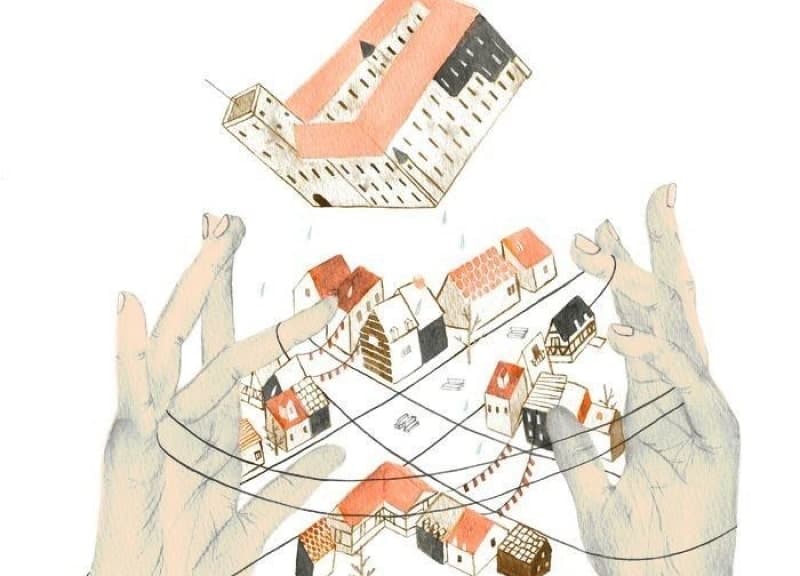
@omprograms
Uncertainty is almost inevitable and, in a way, even a familiar part of our lives. But when the level of uncertainty is high, it can affect a whole range of important aspects of our lives.

Journal “Kholod”
April, 2024
In 1998, I visited New York for the first time and went to Brooklyn to see Brighton Beach. I think if I had gone there directly from the airplane, it would have been hard for me to stay grounded in reality. Brighton Beach seemed like a place stuck in time but having traveled through space and settled next to the ocean, like Torzhok in the 70s. Almost all the signs were in Russian. In the restroom of the "Primorskiy" restaurant, the locks and toilet paper holders were broken, adding a familiar touch.
However, the waiters were attentive. There were three of us, and we ordered three cabbage salads. "Two will be enough for you," said the waitress—a beautiful large brunette of indeterminate age with a bun—and seeing our confused faces, she added confidentially, "The portions are big." The local stores sold black bread, buckwheat, cottage cheese, and condensed milk, as well as "Mishka na Severe" and "Belochka" candies. I appreciated the tact of my friends who had left long ago, always delighted with my nostalgic parcels, to which I carefully added bags of candy.
Another feature of the place was the people, who, for all their heterogeneity-from charming old men in neckerchiefs and genteel purple-headed old ladies in wide white bluecoats to weaselly-looking forty-something merrymakers in caps-were almost in no way integrated into American life.
The Brightonians watched the Vremya program (which no one in Russia seems to watch anymore) and discussed the fate of their homeland. They cursed America and loved America, but had almost no relations with it. And if they did, it was most often through special Russian-speaking "attorneys" who made their small gesheft on their slightly better knowledge of local rules and language. These people left the Soviet or post-Soviet country, often having made great efforts to do so. But they remained much more connected to the life they left than to the one in which they found themselves.
I am now living in London. My emigration is almost four years old. And now I understand much better the Russians from Brighton Beach, who surprised me so much in 1998.
Emigration is very difficult. Of course, it became much easier for me when I had a social circle, when it became clear that I could work in London. But most importantly, I accepted the idea that I would never assimilate. I will never speak English without an accent, I will never be "my own" - not that "fully", but even "to a great extent".
The memory of Brooklyn's ex-Russians made me sad and, frankly, afraid to freeze in time and turn into such a Primorsky restaurant with a broken lock and large portions of coleslaw. It's a frequent story for immigrants all over the world, isn't it? Many "Brooklynites" who move somewhere - mentally do not move, experience depression, disappointment in the move, feel loneliness, inability to maintain close relationships. They are afraid of the future and wish to return to their country of origin regardless of the situation there.
I dealt with my fear in the usual way: I started asking people in my life and social networks and reading articles on the topic in search of ways to adapt. By adaptation, which in a general sense is defined as adaptation to new environmental conditions, I mean the arrangement of life in a new place so that this life subjectively was not worse than the previous one. Maybe better in some respects, maybe not, but so that a person could say: "I am satisfied with the fact that I moved".
I should digress for a moment and say that my experience of being Jewish and a "lousy intellectual" (as my English teacher at school affectionately called us) helped me psychologically in adapting to Britain. In Soviet times, I always felt that I didn't quite belong in "my" country. This, I now realize, prepared me for much of the emigrant experience. I have benefited from such experiences. And for those who have long considered themselves completely their own in Russia - especially successful professionals whose nationality was not questioned - it is probably even more difficult.
After asking people and reading literature, I found that the factors that help adaptation can be divided into the following groups:
Attitude towards the language. It's clear that the ability to speak fluently and eloquently in the language of the country you've moved to helps with adaptation. But that's not the main thing. For most people, this doesn't happen right away and almost never as well as they would like.
It's important to learn to use the language as a tool. The main thing is to be understood and to understand others. Even more important is the mutual intention to understand each other. One of my colleagues, noticing my struggles with my terrible English, calmly said, "This is not just your problem; we must also make an effort to understand you, and it's important for me to be understood by you." I was touched, and this added inspiration and freedom to my communication.
Own activity or, if you like, active socialization. Not passive (where you are invited to visit or go to a concert - for some reason this does not help much), but active: you integrate into the new reality or offer what you can to others: study, work, volunteer, create communities, organize lectures, evenings, and so on.
Creating a mixed social circle that ideally includes people from three conventional groups. 1) Those with whom you can speak your native language and with whom you share a common cultural code. 2) Those with whom you can speak the language of the country you moved to but who, like you, are immigrants. 3) People who were born and raised in that country.
Curiosity about the local culture (its traditions, food, art, history, nature and so on).
Building a relationship with the city, village, neighborhood in which you have settled. Studying architecture, choosing "your" places: favorite cafes, bakeries, corners, streets that you fill with personal associations. I remember when I first moved, my colleague and friend asked: "Have you found a cozy place to drink coffee yet?". The friend knew a lot about moving.
Meanings. A clear understanding of why you moved. For example: I want my children to study in a school where there is no "talking about important things", "I don't want to make "acceptable compromises". Or: "I am afraid that my son will be mobilized", "I want to do science where it is possible". The list goes on and on.
A sense of development and enriching experience. Realizing that as a result of moving you have finally learned a language, learned to survive in different conditions, met amazing people, learned a new profession, and seen the world.
Creating a home. It can be your own home or a rented place, but it's important to make it "your own". This is a rather intimate process. For some people, "where the chair is put, there is home", but for others it is not enough. For some people, a space becomes their own if a person, for example, starts inviting other people to visit, cooking for them. Someone grows his own garden. And for someone it is important to get a dog or fish.
It feels like there's no other home. That is, what used to be home is gone. Many of the people who left have nowhere to go back to. They're fire victims. All that is possible is to try to save "valuables" away from the fire. It's scary to see theaters closed, plays banned, books stuffed in trash bags or removed from libraries. Good thing we know that "manuscripts don't burn." And partly precisely because, outside of a fire, they can be saved.
Recognizing loss. Any emigration, even the most desirable and planned, is associated with loss (of the past familiar life, native smells, favorite places, the opportunity to easily meet and embrace with relatives) and the experience of grief from this loss. If the loss is not recognized and experienced, normal adaptation is impossible.
Therefore, it is extremely important to treat it as a grief, including maintaining, as the excellent Italian psychotherapist Gianni Francesetti accurately puts it, "double loyalty". Faithfulness to what we loved in the past, pre-move life, and faithfulness and openness to the new life, new conditions, contacts, new favorite places. It is important to find a place for the past in the present so that it remains important but does not overshadow the new.
All of the above does not mean that in order to adapt in a new place you have to "forget" about Russia once and for all. Of course, like many of my compatriots who have left, I follow the news from Russia. And of course, I care about what is happening in and around the state where I was born and spent most of my life.
The comments of some people still living (and no longer living) in Russia: "you've left and can't reason about the country", I am genuinely surprised. Of course we can. And worry, and think, and reason. It is clear that the angle of view of people who left and those who stayed is different. But this just creates a more complete picture.
By the way, I don't think I would be so immersed in the news if it weren't for the war. The grief of what is happening and the fact that many people cannot return or do not want to return, on the one hand, hinders adaptation, takes away the energy and time spent on immersing oneself in "Russian news," and on the other hand, maintains a sense of belonging. Paradoxically, there is an advantage to this: many people who share the same values as I do find themselves in a similar situation. And this - the ease of finding like-minded people - is precisely what makes adaptation easier.
In numerous articles on adaptation during emigration, there are two other factors that were never mentioned by my interlocutors. One expected factor is age: it is usually easier for younger people to adapt; the second unexpected factor is appearance: people who look like locals find it much easier to adapt.
I am very grateful to everyone who shared their adaptation experience with me. Thanks to them, I once again came into contact with what helps to adapt in another country. It may not always be easy to follow these recommendations, but if some of these things fit you, it will become easier. I know from my own experience.

Fill out the form below, we will answer your question shortly!

Uncertainty is almost inevitable and, in a way, even a familiar part of our lives. But when the level of uncertainty is high, it can affect a whole range of important aspects of our lives.

WHAT PREVENTS A THERAPIST FROM BEING A THERAPIST?

Alarm levels. What is anxiety and how to deal with anxiety?

What is neurosis, and who are neurotics?